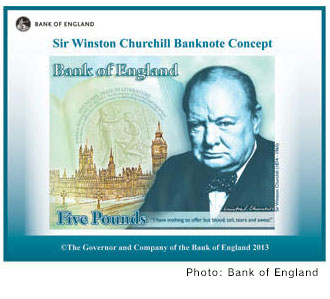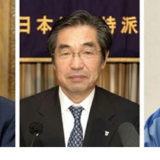TRAVEL NEWS WIRE…
The UK plans to introduce new bank notes in late 2016 made of a plastic polymer instead of the traditional paper and cloth banknotes. The new 5-pound note design will feature British wartime Prime Minister Winston Churchill. Some of the banknotes may also have a transparent window. The banknotes in several other countries are made of cotton and linen, not paper. Polymer banknotes are now used in Brazil, Canada, Australia, New Zealand, and several other countries.
HEALTH AND TECH NEWS
Apple Computer has issued a product recall for its Macbook and iPad power adaptors sold in several countries between 2003 and 2015. The recall covers power adaptors made for markets in Brazil, Argentina, several European countries, New Zealand, and South Korea. So far the recall does not include Japan or Hong Kong. There have been problems with the power adaptors breaking into pieces and creating a risk of electric shock.
THIS WEEK’S NATURAL PHRASE
sweep the problem under the rug
Taylor: My son is doing well with his sports team, but his grades in math and science are very poor. I’m worried that he is spending too much time on sports and not enough time on his homework.
Lyndsey: Did you talk about this problem with your husband?
Taylor: I talked with him many times, but he always just sweeps the problem under the rug and says that things will get better next year. He doesn’t offer any solutions.
Explanation: When a person “sweeps the problem under the rug” it means that they don’t want to fix the problem, and they just say some simple words without really changing anything. We can also use the phrase “sweep the problem under the carpet.” The past tense is “swept the problem under the rug.”
THIS WEEK’S MEDICAL PHRASE
pasteurized
Patient: My stomach feels really bad. Do you think that there could be some bacterial contamination from a glass of milk that I drank this morning?
Doctor: All milk sold in stores is pasteurized and kept at constant temperatures. There shouldn’t be any problem with bacteria. Have you ever had this problem before?
Explanation: The English term “pasteurized” comes from the sterilization process of milk and wine by heating the liquids to kill bacteria, and then keeping them cool to prevent any new bacteria from growing. The name comes from French scientist Louis Pasteur, (born 1822, died 1895)
bacteria (noun): 細菌類
contamination (noun): 汚染
THIS WEEK’S BUSINESS/EMAIL PHRASE
widely accepted
Hello Karen:
The idea of telemedicine is becoming widely accepted around the world. We will soon be able to consult with doctors through our computer screens, and order medicines just by pressing a button. We should invest in this new technology.
Explanation: The term “widely accepted ” means that most people understand and use a technology or system. Credit cards are now widely accepted in stores. Online money transfer has also become a widely accepted method of payment.
 Monday Morning English
Monday Morning English

